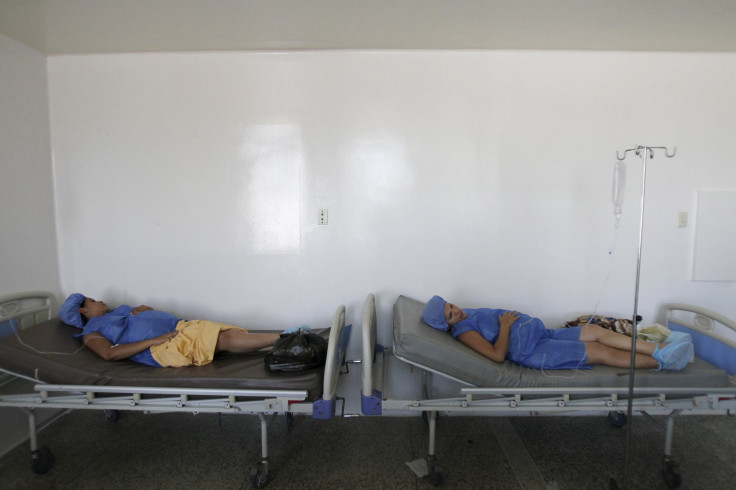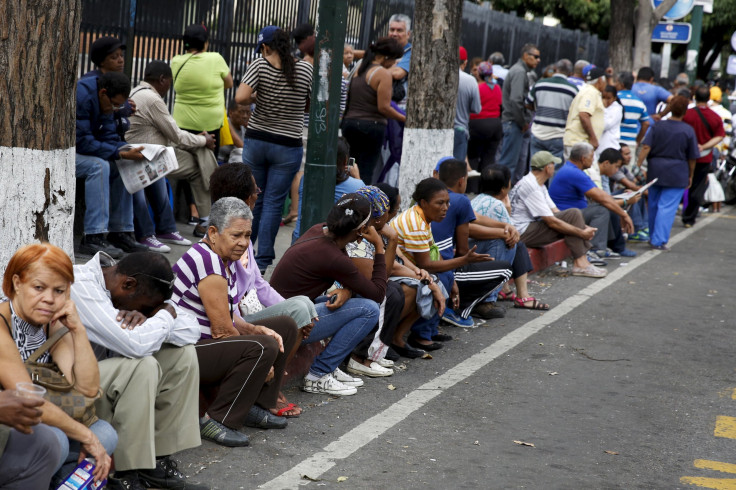Venezuela Healthcare Crisis: Under Maduro, Medical Shortages Reaching Critical Level

The pint-sized patients didn’t look like your everyday protesters. Frail children and teenagers, donning facemasks and hunched over in wheelchairs, clutched signs as they gathered with parents this week in a small crowd in front of the José Manuel de los Rios hospital in Caracas, Venezuela. They pleaded for help with a system they said was failing them. “J.M. RIOS HOSPITAL IN EMERGENCY,” one protest sign blared. “CANCER DOESN’T WAIT,” read another.
It was a demonstration for a desperate situation. The J.M. de los Rios hospital, Venezuela’s pre-eminent medical center for children, was running out of drugs. Its supply of 19 different chemotherapy medicines had gone dry, leaving several young cancer patients untreated for more than two weeks.
But if the situation at J.M. de los Rios was alarming, it wasn’t shocking. It’s the latest development in a long unfolding Venezuelan healthcare crisis that has reached new, severe heights this year. Accessible healthcare was one of the hallmarks of former President Hugo Chávez's socialist revolution, but rampant medicine shortages, aging equipment and an exodus of medical professionals have converged into a slow-motion emergency that has sharply accelerated over the past few months. Cancer patients, pregnant women, those with organ transplants and HIV-positive Venezuelans alike have been left scrambling for care while a black market for pharmaceutical drugs thrives. Venezuela is already staggering under the weight of a sputtering economy and rising political tensions, but human rights groups say the health situation is putting the country on a fast track toward a humanitarian crisis, as well.
“It’s been getting worse every month. It’s getting worse every day,” said Francisco Valencia, director of Codevida, a Caracas-based coalition of organizations dedicated to promoting health rights in Venezuela.
The oncology department at J.M. de los Rios hospital had seen scarcity before, of perhaps three or four chemotherapy drugs at a time, but the recent shortages had reached a new level, Valencia said. Two days after Monday's protest, the hospital received eight of the missing drugs and resumed chemotherapy treatments, but the two-week delay has already stoked new anxieties among patients and health rights groups.
The problems extend far beyond cancer patients. Around 70 percent of medicines in Venezuela, including ibuprofen, treatments for hypertension and birth control, are now in short supply, according to the Venezuelan Pharmaceutical Federation, a trade association of pharmaceutical workers. Codevida presented an assessment of the situation in March to the Inter-American Commission of Human Rights, the regional human rights body, with a lengthy list of additional staggering figures: Around 15,000 people with kidney diseases who need dialysis don’t receive minimum standards of care for their conditions; more than 45,000 people with HIV face shortages of antiretroviral drugs; and nearly 60 percent of pregnant women in the country receive no prenatal care, even while teenage pregnancy rates soar due in part to scarcity of condoms and birth control.
#Venezuela"@martinez_net CHILDREN WAITING 4 CHEMO OUTSIDE J.M. DE LOS RIOS HOSPITAL pic.twitter.com/9wNBCUxvjN" TR.#DrugShortages @HRF @ICRC
— Shaun Murray (@BestWebEnglish) August 11, 2015Patients desperate for medicine have been known to take risky gambles to buy them on the black market, sometimes bartering through social media. But one of the most disturbing trends Valencia has seen in recent weeks has been a rise in the number of people resorting to animal medications to supply their own needs. “We have never seen that, where people are taking medicine for dogs,” he said.
Researchers from Human Rights Watch issued a briefing on Venezuela’s health situation in late April, noting widespread hospital shortages of even basic supplies like gauze and syringes. The group had “rarely seen access to essential medicines deteriorate as quickly as it has in Venezuela except in war zones,” the report said.
The healthcare crisis is one that affects everyone in Venezuela, regardless of geography or income bracket, said Diederik Lohman, associate health and human rights director for Human Rights Watch. “It doesn’t matter how much money you have. If you want to go and buy certain things, you won’t be able to find them,” he said.
The supply shortages are rooted in the same economic woes that have produced endless lines at supermarkets in recent months as people wait hours for basic staples like milk or toilet paper. Venezuela faces an acute shortage of foreign currency that has become exacerbated as the price of crude oil, which makes up 95 percent of its exports, began plunging last year. Most of Venezuela’s food and medicine is imported, but Venezuelan importers aren’t able to access the dollars they need to buy goods on the international market. Those who are find much more incentive to exchange them on the black market, where dollars are worth 10 times as much as they are at the official government rate.
Other problems compound the scarcity crisis. The Venezuelan government hasn’t boosted investments in healthcare infrastructure or doctors’ salaries, so medical professionals are leaving the public healthcare system for private hospitals. Private hospitals, too, are overcrowded and face the same scarcity of medical supplies because of the foreign currency shortage.
Young Venezuelans looking at careers in medicine are increasingly opting for job opportunities abroad. More than 13,000 medical professionals have left the country in the last 12 years with nobody to replace them, according to the Medical Federation of Venezuela, an organization representing Venezuelan doctors. The country has increasingly relied on so-called community doctors, mainly Cuban medical professionals, who provide care in mostly poor and rural areas, but they generally do not provide the same range of care that hospitals and specialists provide.

The government of President Nicolas Maduro is left holding the reins to fix the crisis, but it hasn’t acknowledged a crisis even exists. Maduro has frequently attributed shortages to hoarders attempting to wage an “economic war” on the country. Government officials briefly detained executives from a top Venezuelan pharmacy chain, Farmatodo, in February, alleging they were intentionally trying to keep lines long.
Human rights groups have also seen little feedback from the administration about their concerns. Javier Ciurlizza, Latin America program director for the International Crisis Group, a nongovernmental organization headquartered in Brussels, said his team repeatedly reached out to ministers in charge of healthcare and food supplies while conducting research in Venezuela earlier this summer. “The official response has been absolute silence,” he said.
There may be one window of opportunity ahead. Long-awaited parliamentary elections are scheduled for December, and those could give the political opposition its biggest chance in more than a decade to wrest control of the legislature and challenge Maduro’s policies from a position of power. Tensions have been rising in the runup to the elections as the government has barred key opposition leaders from running and batted away foreign election monitors. Meanwhile, anger over the shortages keeps festering.
But there’s not much time to waste, said Valencia, the Codevida director, who estimated that the situation could unfold into a full-scale humanitarian crisis within three or four months.
“This crisis, it will come,” he said. “We’re going to see a lot of deaths.”
© Copyright IBTimes 2025. All rights reserved.





















